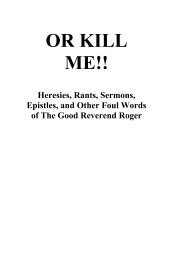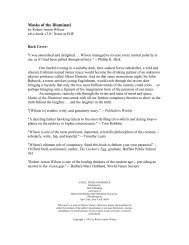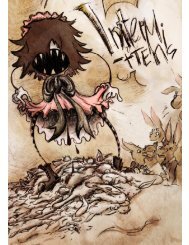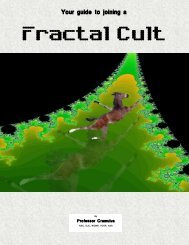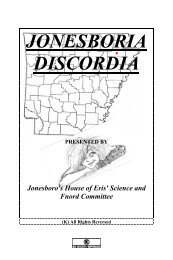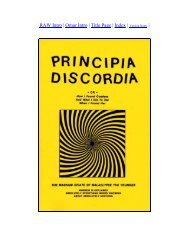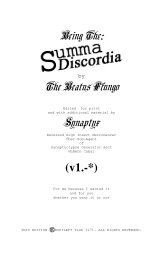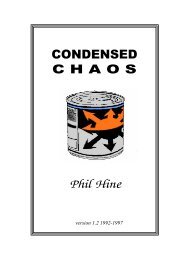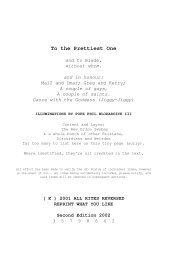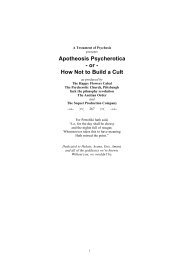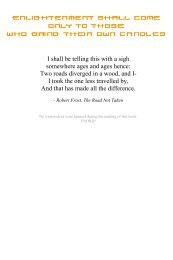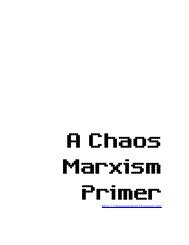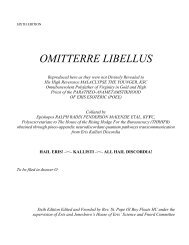Coincidance - Principia Discordia
Coincidance - Principia Discordia
Coincidance - Principia Discordia
You also want an ePaper? Increase the reach of your titles
YUMPU automatically turns print PDFs into web optimized ePapers that Google loves.
94 COINCIDANCE<br />
hoping to procure for Molly a lover less gross and offensive to Bloom's<br />
sensibilities than Boylan, as Marilyn French recently suggested, the answer<br />
lies in a four-letter word that each of Joyce's three major characters speaks<br />
once at a crucial point in the narrative. Stephen speaks it first, in the library,<br />
when asking himself what he left out of his theory of Hamlet; he answers,<br />
"Love, yes. Word known to all men." Bloom speaks it to the Citizen, offering<br />
an alternative to politics and national hatreds:<br />
—Love, says Bloom. I mean the opposite of hatred.<br />
And Molly concludes her ruminations of What's Wrong With Men by<br />
repeating the theme of the two major male voices in the narrative:<br />
they don't know what love is<br />
When Bloom brings Stephen home to Eccles Street to feed him, they<br />
share "Epp's massproduct"—Epp's cocoa—but Joyce the punster is telling us<br />
what can seize the keys of hell and death, proclaim the praise of life, and<br />
make the abseni present. The cocoa is not only massproduced but is for<br />
Stephen a new Mass produced: a Mass of humanity to replace the Mass of<br />
God who may be dead or missing-in-action. "The physician's love heals the<br />
patient," wrote the psychiatrist Ian Sutrie; Bloom's love, I think we are<br />
meant to believe, heals Stephen's agenbite of inwit. The point of Bloom's<br />
charity is precisely that it has no reasons. Beneath the Odyssey, Hamlet and<br />
Don Giovanni (recently discovered), Ulysses also parallels the most effective and<br />
memorable of the parables of Jesus: the story of the Good Samaritan.<br />
The dead and absent survive, then, because we love them. Ulysses itself,<br />
the most complexly intellectual of comedies, is a testament to love: to Alfred<br />
Hunter, a man of whom we know only a few facts: he lived in Dublin in<br />
1904; he was Jewish; his wife was, according to gossip, unfaithful; and one<br />
night he took home a drunken, depressed, impoverished and totally<br />
embittered young man named James Joyce and sobered him and fed him. All<br />
else about Alfred Hunter is lost, but those facts plus artistic imagination<br />
created "Leopold Bloom"; and if Hunter is dead and absent, Bloom remains<br />
forever alive and present for students of literature.<br />
The curiosity of Joyce's mature technique is that while on first reading<br />
Ulysses seems only intermittently funny and consistently "naturalistic<br />
(realistic), on successive re-readings it becomes progressively funnier and<br />
spookier. None of Joyce's 100 or more major and minor characters knows<br />
fully what is going on in Dublin on that one extraordinarily ordinary day of<br />
16 June 1904. The first-time reader is similarly ignorant, navigating through<br />
18 chapters and 18 hours of "realism" that is often as squalid and confusing



